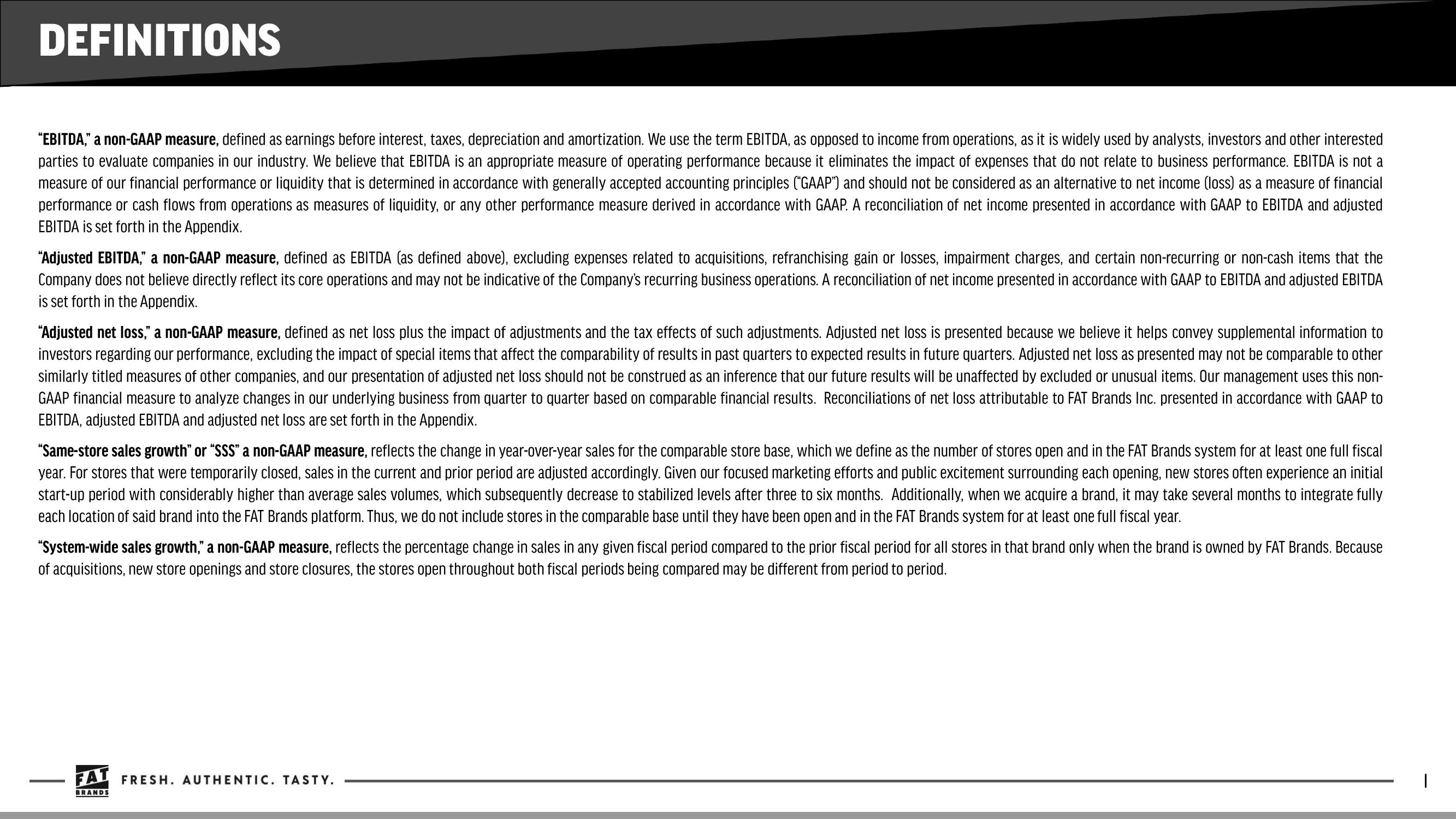FAT Brands Results Presentation Deck
DEFINITIONS
"EBITDA," a non-GAAP measure, defined as earnings before interest, taxes, depreciation and amortization. We use the term EBITDA, as opposed to income from operations, as it is widely used by analysts, investors and other interested
parties to evaluate companies in our industry. We believe that EBITDA is an appropriate measure of operating performance because it eliminates the impact of expenses that do not relate to business performance. EBITDA is not a
measure of our financial performance or liquidity that is determined in accordance with generally accepted accounting principles ("GAAP") and should not be considered as an alternative to net income (loss) as a measure of financial
performance or cash flows from operations as measures of liquidity, or any other performance measure derived in accordance with GAAP. A reconciliation of net income presented in accordance with GAAP to EBITDA and adjusted
EBITDA is set forth in the Appendix.
"Adjusted EBITDA," a non-GAAP measure, defined as EBITDA (as defined above), excluding expenses related to acquisitions, refranchising gain or losses, impairment charges, and certain non-recurring or non-cash items that the
Company does not believe directly reflect its core operations and may not be indicative of the Company's recurring business operations. A reconciliation of net income presented in accordance with GAAP to EBITDA and adjusted EBITDA
is set forth in the Appendix.
"Adjusted net loss," a non-GAAP measure, defined as net loss plus the impact of adjustments and the tax effects of such adjustments. Adjusted net loss is presented because we believe it helps convey supplemental information to
investors regarding our performance, excluding the impact of special items that affect the comparability of results in past quarters to expected results in future quarters. Adjusted net loss as presented may not be comparable to other
similarly titled measures of other companies, and our presentation of adjusted net loss should not be construed as an inference that our future results will be unaffected by excluded or unusual items. Our management uses this non-
GAAP financial measure to analyze changes in our underlying business from quarter to quarter based on comparable financial results. Reconciliations of net loss attributable to FAT Brands Inc. presented in accordance with GAAP to
EBITDA, adjusted EBITDA and adjusted net loss are set forth in the Appendix.
"Same-store sales growth" or "SSS" a non-GAAP measure, reflects the change in year-over-year sales for the comparable store base, which we define as the number of stores open and in the FAT Brands system for at least one full fiscal
year. For stores that were temporarily closed, sales in the current and prior period are adjusted accordingly. Given our focused marketing efforts and public excitement surrounding each opening, new stores often experience an initial
start-up period with considerably higher than average sales volumes, which subsequently decrease to stabilized levels after three to six months. Additionally, when we acquire a brand, it may take several months to integrate fully
each location of said brand into the FAT Brands platform. Thus, we do not include stores in the comparable base until they have been open and in the FAT Brands system for at least one full fiscal year.
"System-wide sales growth," a non-GAAP measure, reflects the percentage change in sales in any given fiscal period compared to the prior fiscal period for all stores in that brand only when the brand is owned by FAT Brands. Because
of acquisitions, new store openings and store closures, the stores open throughout both fiscal periods being compared may be different from period to period.
I
FAT FRESH. AUTHENTIC. TASTY.
BRANDSView entire presentation